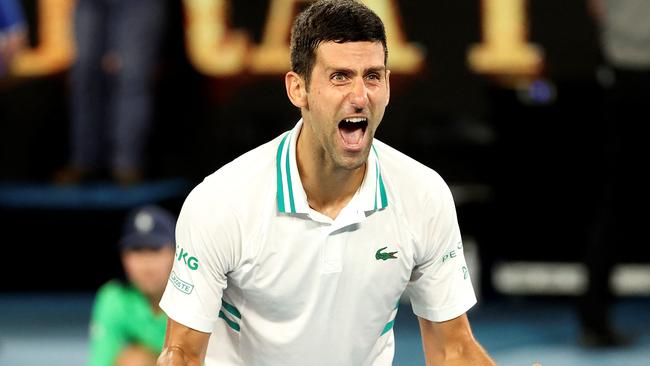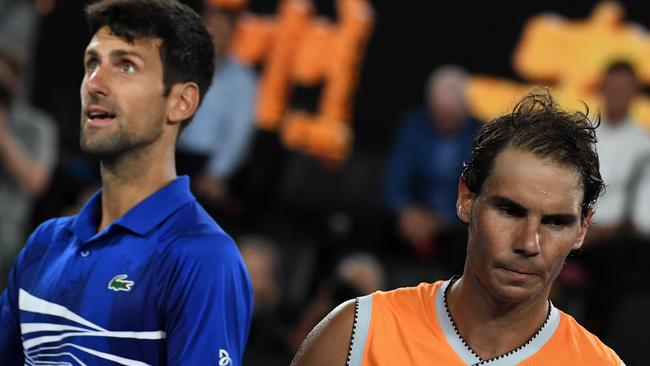Nadel, Federer, Djokovic all have 20 grand slams but Serbian star has always seemed odd one out
The 2019 Wimbledon final crowd was pro-Federer. “When the crowd chanted ‘Roger’, I heard ‘Novak’,” he later said. It’s the same stubbornness that has landed him in his current plight.

Novak Djokovic tells an interesting story about Nato’s bombing of Belgrade during the spring of 1999.
He was 11, the eldest of three boys, and on that first night the Djokovic apartment shook, everything went dark. His mum fell and hit her head against a radiator, his dad told him to check if his brothers were OK.
Soon they left the apartment and through the city’s darkness made the short journey to the building where his aunt lived. It had a basement shelter and there they would spend 78 consecutive nights.

Every evening at 8.30, the sirens sounded. Soon the bombs fell. At first it was terrifying.
“Somewhere during the course of the bombings,” Djokovic wrote in his book Serve To Win, “something changed in me, in my family, in my people. We decided to stop being afraid. After so much death, so much destruction, we simply stopped hiding.”
The background and the mentality that came from that experience are part of the reason Djokovic has been my favourite of the three greatest players of this, and perhaps any tennis generation. There are other reasons for the affinity. In the company of Roger Federer and Rafael Nadal, Djokovic has seemed the outsider.
He got to the summit a few years after the others. There was the sense then, and at times since, that Federer and Nadal considered two company but three a crowd. For a time Djokovic was the Serbian underdog. That suited him.
“At the beginning of my career,” he once said, “I was observed as a rebel, somebody who comes in the mix and starts to challenge the two guys that were so dominant. ‘Who is this guy from Serbia, small country, comes from nowhere and starts saying he can beat the top guys and become No 1?’ I understand the people’s reaction to that, but I felt that the only way for me to get out there was to show that I deserved to be there.”
That much he has shown.
When you get to where he, Federer and Nadal have got, it is because you are a singular human being.
“First thing you need to know about me is that I’m not good at normal,” the champion jump jockey Richard Dunwoody said on the occasion of our first proper conversation in 1999. In the galaxy of sports stars Dunwoody is not alone in his normalcy reticence.
Federer and Nadal were always better at seeming normal. Djokovic exposed more of his inner self. From the beginning, he was himself. To his first training session with Jelena Gencic, the most influential coach in his career, he turned up with a racket, water bottle, balls, wristbands and rolled up towel all neatly folded into his bag.

“Who packed this for you?” asked Gencic. Djokovic was six at the time and later recalled his resentment at the question. “I did,” he said.
Gencic taught him tennis and introduced him to classical music and the poetry of Alexander Pushkin.
“I was not born to amuse the Tsars,” the Russian poet wrote. Djokovic had a similar feeling when he got within shooting distance of Federer and Nadal.
From all of his victories, perhaps Wimbledon 2019 was the greatest so far. He and Federer slugged it out for almost five hours. Brutal. Brilliant. Cruel.
Federer delivered more of the brilliance but could not cope with his opponent’s clinical efficiency in the tie-breaks. Twenty of the 33 points in the three tie-breaks were fought from the baseline. Djokovic won 16.
Tie-breaks are about keeping the ball in play, not missing, making your opponent play another shot, giving him another opportunity to make a mistake. Federer made 19 avoidable mistakes in those tie-breaks. Djokovic made one. Can elite level sport have ever offered a greater demonstration of mental strength?
There should be a footnote to that Wimbledon final reminding us that the crowd was boisterously pro-Federer. Some who watched it live felt uncomfortable at the level of partisanship. “When the crowd chanted ‘Roger, Roger,’ said Djokovic afterwards, “I heard ‘Novak, Novak.’”
It is the same single-mindedness, fearlessness and stubbornness that has landed Djokovic in an unwanted room at the Park Hotel in Carlton, an inner-city suburb of Melbourne.
He was against mandatory vaccination from the beginning and because he spoke publicly about his reticence to be vaccinated, he was seen as an advocate for the anti-vaccination lobby.

This is unfair as his position is more nuanced. “My issue with vaccines is if someone is forcing me to put something in my body. That I don’t want. For me that’s unacceptable. I am not against vaccination of any kind, because who am I to speak about vaccines when there are people that have been in the field of medicine and saving lives around the world?” he said before the 2020 US Open. Many will feel zero sympathy for Djokovic. I get that.
Who knows what will happen on Monday when an Australian court considers his appeal against the decision not to accept his exemption? He claims his exemption, based on his having tested positive for Covid-19 in the previous six months, was approved by medical officials from both Tennis Australia and the Victoria state government.
There is, though, a photograph of him with school kids at an awards ceremony, allegedly the day after he says he tested positive for the virus. That photo, if taken on December 16, will not be easily explained.
I don’t expect to him to be in the draw for this year’s Australian Open and, without him, it will be a lesser tournament.
What has taken Djokovic to the brink of history has also stopped him from having his shot at it, at least in Australia this year.
One day, for sure, he will get there.
What unvaxxed Djokovic’s 2022 will look like
- Stuart Fraser
Novak Djokovic is likely to be refused entry to further tournaments this season if he does not meet the increasing number of Covid-19 vaccine requirements being introduced across the world.
The world No. 1 from Serbia is in limbo over his participation at the Australian Open, which starts on January 17. His visa was cancelled after arriving at Melbourne Tullamarine airport on Wednesday and he must wait at a centre for asylum seekers until at least Monday for a court to decide whether he can stay and defend his title.
Rafael Nadal, his long-time rival, said that he “did not like the situation” Djokovic was in, but added that there were “consequences” for his decision to seek an exemption from the Australian Open’s vaccine requirement.

Those consequences are likely to include similar issues in the coming months if Djokovic, 34, does not show evidence that he is fully vaccinated. Although border rules differ from country to country, more tournaments are set to demand that players must present a valid vaccination certificate to enter.
It is understood that players have been told to expect this rule to be in place in the United States at Indian Wells and the Miami Open in March, while the hard line stance of the French president, Emmanuel Macron, on those who are unvaccinated is likely to result in similar arrangements at the French Open in May, where Djokovic is the defending champion.
No decision has been made by Wimbledon organisers.
While there will be some exemptions for those with valid medical reasons, there will not be consistency in the criteria between different events, making it a complex logistical minefield for unvaccinated players.
Deferring vaccination because of a recent infection is unlikely to be a reason that can be cited regularly.
Nadal, who is returning from a foot injury, can move into an outright lead on the list of all-time major winners if he is victorious in Australia. He is tied with Roger Federer and Djokovic on 20 titles, and sent a firm message to the Serbian.
“If he [Djokovic] wanted, he would be playing here in Australia without a problem,” Nadal, 35, said.
“He made his own decisions, and everybody is free to take their own decisions, but then there are some consequences. I don’t like the situation that is happening. In some way, I feel sorry for him.
But he knew the conditions since a lot of months ago, so he makes his own decision.”
This article originally appeared on The Times.







To join the conversation, please log in. Don't have an account? Register
Join the conversation, you are commenting as Logout